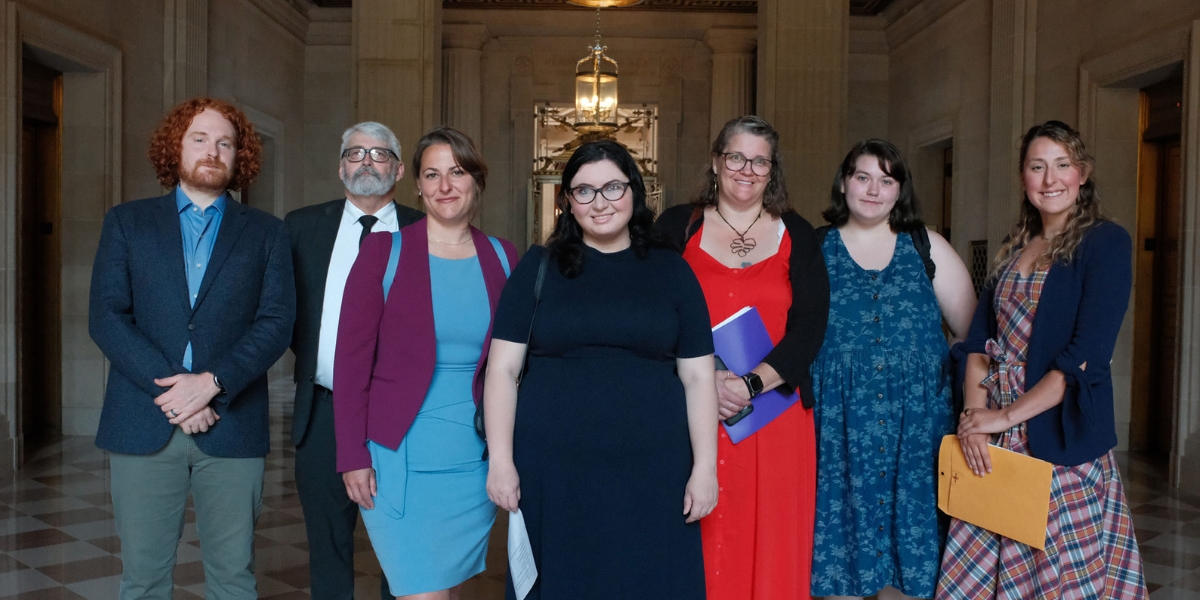By Andrew Young
On June 11-14, The Alliance for Appalachia united in Washington, D.C., to demand environmental justice for Appalachia. Appalachians aged eight through 78 walked the halls of Capitol Hill together, sharing stories about our region, speaking truth to power, and fighting for the places and people we love. It was quite a sight to behold!
I joined 40 other Appalachians from seven states, representing 16 organizations across the region. We shared important skills with one another, like how to meet with legislators and staff and how to combine our learned experiences as Appalachians with data and evidence to advance policy goals at the Federal level. Together, we met with more than 50 Congressional offices, three regulatory agencies, and four White House executive offices. We asked members of Congress to cosponsor the A. Donald McEachin Environmental Justice for All Act. We asked Congress to end mountaintop removal coal mining and pass the Appalachian Communities Health Equity (ACHE) Act. We called for accountability for coal mine reclamation and bonding reform. We also demanded that Congress rescind funding for the Letcher County Prison Project.
The Alliance for Appalachia is a coalition of 18 member organizations founded in 2006 to strengthen the region’s effort to end mountaintop removal coal mining. The West Virginia Highlands Conservancy has been a long-time member of The Alliance for Appalachia and was part of its founding. For more information on The Alliance for Appalachia, visit theallianceforappalachia.org
Appalachian people are visionary, innovative, fair-minded, and fiercely passionate about building a future where everyone can survive and thrive while sustaining our special ways of life. However, it is no secret that we are suffering from the cumulative impacts of class inequality, legacy pollution, neglected infrastructure, industry-captured government, greedy corporations, underfunded public education, cultural stereotypes, and inequality of opportunity relative to citizens of many other non-Appalachian states. The list goes on. At its core, the fossil fuel and resource extraction economic practices like mountaintop removal coal mining, clear-cut timbering, natural gas pipelines, and shale fracking for natural gas destroy ecosystems and endanger communities throughout their supply chains.
I was proud to join The Alliance for Appalachia to advocate for more protection for our communities and environment. To better understand our efforts, let’s take a closer look at each of the key bills we lobbied for during our time in D.C.
The Environmental Justice for All Act, H.R. 1705/ S. 919 aims to address environmental justice issues across the country, including the potential to have far-reaching impacts on communities that have been disproportionately affected by environmental hazards and legacy pollution. The Appalachian region has long been impacted by the consequences of extractive industries and has suffered from a lack of adequate environmental protections and enforcement due to state agencies that are captured by special interests (these same interests also run the state legislatures). The Environmental Justice for All Act strengthens legal protections for Environmental Justice communities, increases funding for proactive programs, and enhances public participation in environmental decision-making processes.
The ACHE Act, or Appalachian Communities Health Equity Act, H.R. 5022, would place a moratorium on issuing and renewing permits for mountaintop removal coal mining until a health study is conducted. Mountaintop removal destroys mountains and headwater streams, and ultrafine airborne particulates like silica lead to rare cancers in the surrounding communities where people are forced to breathe them in. This is happening across the State of West Virginia, where cancer rates, mortality rates, and chronic illnesses are far higher in coal-producing areas than in the rest of the United States, and these higher cancer rates have been linked to mountaintop coal mining.
The Zombie Mine Prevention Package is a suite of three bills addressing crucial issues related to mine reclamation and environmental protection. In similar ways that active mining puts communities at risk, so too do unreclaimed “zombie mines” with wash-outs, permanent toxic mine drainage, denuded and unstable soils, sedimentation, and increased severity of flooding impacts due to lack of vegetation. Issues such as chronic violations, unpaid fines, and flooding across the region strengthen the case for these legislation initiatives.
- The Coal Cleanup Taxpayer Protection Act, H.R. 7940, eliminates self-bonding and requires an appraisal of any property used for bonding purposes. It also requires states to regularly evaluate the adequacy of bond amounts.
- Bond Improvement and Reclamation Assurance Act, H.R. 8941, ensures sufficient bond amounts and long-term water treatment. It clarifies that coal company executives are on the hook for full reclamation costs.
- Stream Protection and Vegetation Restoration Act, H.R. 8062, requires contemporaneous reclamation and prohibits permits from sitting idle for more than a total of six months within any three-year period.
Lastly, we lobbied Congress to build community, not more federal prisons, and rescind funding for the Letcher County, Kentucky, Prison Project. Prisons are not part of a just transition nor healthy economies. Prisons perpetuate environmental injustices and mass incarceration. This project, an earmark for Kentucky Representative, Hal Rogers, would be built on the site of an old strip mine. It would affect communities within a 500-mile radius of Roxana, Kentucky, and particularly families of individuals sentenced to federal prison. We demanded Congress rescind the $500 million in the FY25 appropriations bill for the proposed federal prison project as an unjust, unnecessary, wasteful use of taxpayer money.

Until there is environmental and economic justice, the strictly non-partisan Alliance will turn to our proud history of resistance and stubbornly demand a just transition off fossil fuels. We are stronger together and will never stop fighting to achieve the promise of America for everyone!
You can help amplify our voices by contacting your legislators today. Our friends at Appalachian Voices have set up an action alert where you can quickly send a letter to your representatives at appvoices.org/actions/stop-zombie-mines/

